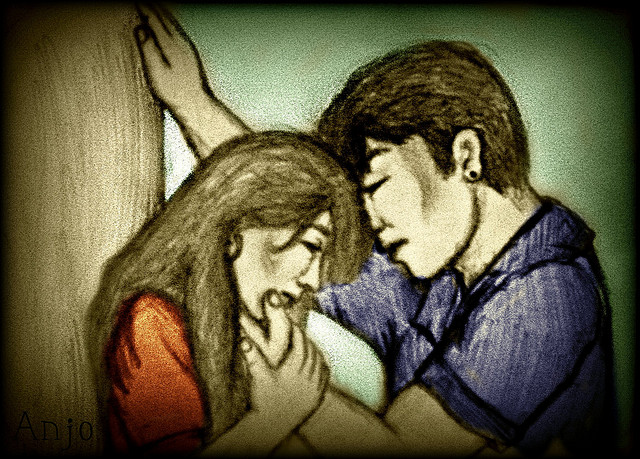There are very few people who have not been touched by the pain and heartache of infidelity.
If you are one of the lucky few who have never been cheated on, you are truly blessed. It’s wonderful to live in a world of trust, faith and confidence that the person you are intimate with is—and only wants to be—with you.
But for those of us who have had the unfortunate and often life-changing experience of being cheated on—and then having to go through the process of grieving, understanding what happened and learning to trust again—it’s important to give ourselves time to go through all of the different stages, at our own pace, in whatever messy and ugly form it takes.
And it will be messy and ugly.
But you’ll get through it.
Stage 1: Shock. Typically, we can’t wrap our heads around the fact that the person we’ve loved and trusted most in this world has betrayed us. We literally can’t comprehend that it’s happening to us.
“This sh*t happens to other people, but not to me!”
It happens in those slickly produced ABC dramas, like Betrayed—it happens to the celebrities on the cover of Us Weekly.
But never to us, right?
We may spend days—weeks—in a complete daze. We can’t eat. We can’t sleep. We can’t focus on what people are saying. We can’t even breathe. Taking air into our lungs is actually physically painful. We wonder 10 times a day if we will ever wake up again feeling normal or be able to keep down a solid meal.
Nothing makes sense. Nothing.
Stage 2: CSI Mode. This is the stage where we become the world’s most prolific private investigators!
We spend every waking minute trying to piece together clues, that didn’t make sense at the time, but now make perfect sense to us. We may go back and re-read emails from our ex, looking for clues that there was somebody else. We try to decipher if there was any indication whatsoever that he or she wasn’t happy with us.
We stalk Facebook, Instagram and other social media sites trying to find any and all information about the person he or she cheated on us with. We talk to every person who will listen—concocting possible scenarios on how, when and where this all started, spewing new theories on how he or she pulled this off without us catching them sooner.
Then we realize that all of this investigating is doing nothing more than doubling the pain we are already in. So we abort the investigation at the advice of our highly-paid therapist or well-meaning family and friends who are watching us spiral out of control.
Stage 3: Complete Breakdown Mode. The reality of what’s happened has settled in, and we feel gutted. We spend up to 10 hours a day doing the ugly cry. The pain of what has happened has really hit and the grieving process has begun.
It’s equivalent to those weeks that follow the death of someone we love. Once we get past the initial shock and formalities of burying them, we are now left completely alone with it. That horrible—it happened.
We may fall into a complete depression. We feel listless. We start to lose interest in everything that once made us happy.
We go through the motions of going to work, school or taking care of our kids with a big fake smile on our faces. Telling people we’re “fine“—we’re “hanging in there.” When inside, it feels like we’ll never make it through another day.
Stage 4: Rage. Once all those tears have been cried—the hot, burning rage of the betrayal bubbles to the surface, and the anger and rage erupt like a long dormant volcano that hasn’t exploded in 50 years. It’s f*cking ugly. It’s brutal.
We rage at the person who betrayed us. We scream at the walls. We scream at the steering wheel of the car. We punch pillows. We rage at friends. People are starting to wonder who this ugly, angry, bitter person is.
This is not who we are. This is what we’ve become because of it—and this mere fact makes our rage even more powerful.
Stage 5: Heroic Attempt to Move Forward as if Nothing Happened. When we realize that we have to go back to living a normal life, we slowly stop talking about it. We pretend nothing ever happened. We go back to the gym, start meeting people for drinks, and flirt with the hottie at the bar.
Yep, we got this. We can move past it. We double snap those fingers in the air and saunter off into the sunset, fully believing that we are getting over this horrible nightmare.
Stage 6: Revenge Sex. Once we are no longer a blubbering, red-rim eyed, hysterical wreck—people start to notice us again. We’re looking good. Men and women start checking us out.
We’re still hurting, so we sleep with a few people to numb the pain. We do what we gotta do to feel good for a night or two. We deserve it, because Stage 7 is fast approaching, and it ain’t going to be pretty.
Stage 7: Complete Breakdown Mode (Second Round). We moved through all the stages of grief way too fast and haven’t gotten to the core issues of what the infidelity has truly done to our heart. How it’s affected our trust in people. What we may have made it mean about ourselves, in our minds.
Expect a sh*t-load of more tears, more rage, the occasional revenge sex and more depression.
Stage 8: Therapy, Releasing, Healing. Once we realize that we can’t keep living like this, we may seek professional help—a good therapist. A great trainer to help release some of the emotions—a Reiki Master, a Life Coach—whatever works. We start the real process of healing and overcoming the trauma.
Some of us actually acknowledge, at this point, that what we’ve been through is a trauma. Then we start to do the real work of moving forward.
Stage 9: Opening our Heart Again. It’s hard to trust anybody again. Emotions and feelings are scary when it comes to the opposite sex. We stay guarded. We open our heart a little—then withdraw. We lean in, and then lean back out. This is scary, learning to trust again.
But we trust our intuition more. It’s a process—one that will take some time.
Stage 10: Knowing it will all be Okay. When this journey started, we may have believed that nothing would ever be okay again. The world would never feel normal—we would never feel normal. We would always be broken, shattered, distrustful, unworthy of love.
Except now we realize this is all bullsh*t. Yes, it’s been a long, painful road, but we’re starting to feel hope again.
We start seeing new possibilities for our future. There is something better out there for us.
We’ve survived one of the toughest and most painful blows to our sense of selves. But we are now stronger—wiser. More in touch with what makes us happy—what we need in a partner. What we won’t accept down the line.
And hopefully, confident that we will find love again.
.
Relephant:
Healing After an Affair: Where to From Here?
.
Author: Dina Strada
Editor: Yoli Ramazzina
Photo: Flickr/tacit requiem


 Share on bsky
Share on bsky





Read 5 comments and reply